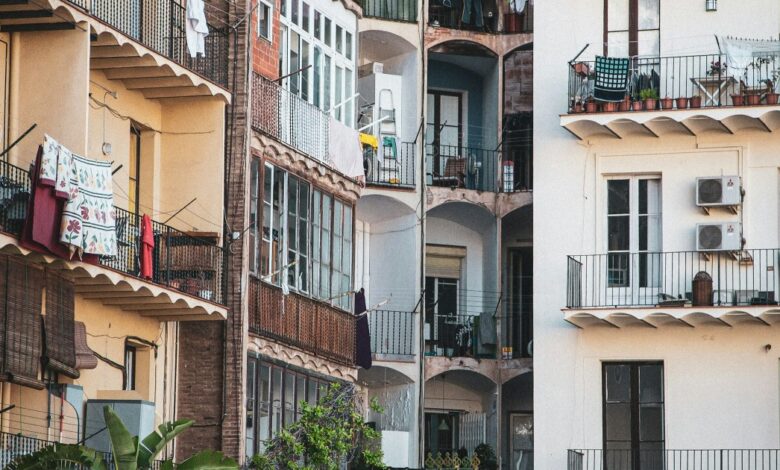Squatting in Spain: Understanding Spain’s “okupas” problem

With the rise of ‘okupación’ in Spain, property owners and individuals alike are seeking to navigate the legal landscape and social implications of squatting. This comprehensive guide offers insights into the legal framework, personal experiences, and practical strategies to address the challenges posed by squatting in Spain. This is everything you need to know about Spain’s “okupas” problem.
Legal landscape: Squatters’ rights vs. property owners’ rights
What are the rules for squatters in Spain? The contentious issue of squatting in Spain, locally known as ‘okupación’, presents a complex legal scenario that intertwines the rights of property owners with those of squatters. At the heart of this debate is the Urban Leases Act of 1994, which delineates the legal boundaries within which property occupation can occur. This legislation is critical in understanding the rights and protections afforded to both parties, and it serves as a cornerstone for resolving disputes related to squatting.
Under Spanish law, squatting is not explicitly permitted; however, certain conditions may provide squatters with some level of legal standing. For instance, if a property is not adequately secured and is left unattended, it becomes vulnerable to occupation. Once inside, squatters may claim a right to housing, complicating the eviction process for property owners. On the other side, property owners have specific legal recourses to reclaim their rights, including fast-track eviction procedures that have been implemented to streamline the process. Nevertheless, these measures require a clear understanding of the legal framework and often involve navigating through intricate legal channels.
It is essential for property owners in Spain to be proactive in protecting their assets against potential squatting. This includes ensuring that properties are properly secured, regularly monitored, and that any signs of illegal occupation are promptly addressed with legal action. For squatters, it is important to be aware of the legal risks associated with occupying a property without consent, as well as the potential social and ethical considerations of such actions.
The rise of the ‘okupa’: Economic crisis and housing shortages
How common is squatting in Spain? The phenomenon of ‘okupación’—the Spanish term for squatting—has surged in recent years, fuelled by a complex blend of socio-economic factors. At the forefront is the economic crisis that has gripped Spain, leaving a trail of high unemployment rates and financial instability. This precarious situation has forced many, particularly young people aged between 18 to 24, to consider squatting as a last resort due to the scarcity of affordable housing options. The issue is further exacerbated for those still living with parents, unable to step onto the property ladder in a market where prices have not aligned with the economic reality of the average citizen.
Moreover, the housing crisis has been intensified by a significant number of properties owned by banks—a consequence of the financial crisis and subsequent bailouts. Activist groups such as the PAH (Platform for People Affected by Mortgages) have emerged in response, utilising a variety of tactics to address the housing shortage. In Catalonia alone, which has a high level number of squatters relative to the total in Spain, movements like PAH have become instrumental in advocating for housing rights. The intersection of these social dynamics and economic hardships paints a vivid picture of why squatting in Spain has become not just a matter of legality, but also a symptom of a deeper societal issue.
Strategies for prevention and eviction of squatters in Spain
For property owners in Spain, the rise of squatting has necessitated the adoption of robust strategies to safeguard their properties. Preventive measures are crucial and include steps such as installing adequate security systems, conducting regular property inspections, and ensuring that all potential entry points are securely sealed. Awareness and vigilance are key in deterring would-be squatters from targeting a property. Additionally, building a network with neighbours and local community members can act as an early warning system to any suspicious activity.
In instances where prevention fails, property owners must be versed in the legal avenues available for eviction. Spanish law provides for an immediate eviction procedure that can be enacted within 48 hours of illegal occupation, provided that the property owner can promptly demonstrate proof of ownership and report the occupation to authorities swiftly. This fast-track process is designed to minimise the duration of unlawful squatting and mitigate the potential damage and costs incurred by property owners. It is imperative for owners to understand these legal strategies and act decisively to reclaim their rights in the face of squatting challenges.
Personal accounts: The emotional toll of squatting disputes in Spain
The battle against squatting in Spain is not only a legal skirmish but also a deeply personal and emotional one for many property owners. The stories of those who have endured the frustration and helplessness of having their properties occupied illicitly are both compelling and heart-wrenching. These narratives underscore the profound impact that squatting can have on individuals, extending far beyond the financial losses to include significant emotional distress and a sense of violation.
Property owners have shared experiences of feeling powerless as they grapple with the lengthy and often cumbersome legal process to evict squatters. The emotional toll is exacerbated by the fact that, in some cases, squatters can live in a property for years before being legally removed, during which time the owner must continue to pay for utilities and taxes. The sense of injustice is palpable among those who have invested their life savings into a home, only to see it usurped by others. These personal accounts serve as a stark reminder of the human element at the core of squatting disputes and the urgent need for a more efficient resolution system.
Seeking change: Advocacy for legal reform in Spain
In light of the complex and often protracted nature of squatting disputes in Spain, there is a growing chorus among property owners and legal experts advocating for reform. The current legal framework, while providing some avenues for recourse, is frequently criticised for not being sufficiently agile or responsive to the needs of property owners. Advocates argue that the system needs to be overhauled to ensure that rights can be reclaimed more swiftly and equitably.
Proposed changes to legislation include shortening the legal timeframe for evictions, enhancing the protection of property rights, and increasing penalties for those found guilty of squatting. These reforms aim to deter squatting by making it less attractive and more risky, while also providing property owners with a more straightforward path to regaining possession of their properties. By streamlining the judicial process and closing legal loopholes, it is hoped that property owners will face fewer obstacles in protecting their investments and that squatting in Spain will become a less pervasive issue.
The ‘okupa’ movement and public perception in Spain
The ‘okupa’ movement in Spain is not merely a legal issue but also a cultural phenomenon that has garnered diverse public opinions. Understanding this movement involves delving into the broader social context of Spanish society, where economic strife and housing crises have pushed the narrative of squatting into the public domain. The portrayal of squatters in media coverage has significantly influenced public perception, often painting a picture that ranges from sympathetic portrayals of those seeking shelter to negative depictions of criminal activity.
Media reports have been instrumental in shaping the narrative around squatting, with stories of ‘okupas’ sometimes being sensationalised to highlight conflicts and drama. However, it’s important to consider the stories of individuals involved in squatting, which often reveal a more complex reality. Young people aged between 18 to 24, for instance, are increasingly seen squatting properties owned by banks, highlighting a generational struggle for affordable living spaces. The public’s perception is further complicated by activist groups like PAH (Platform for People Affected by Mortgages) in Catalonia and across Spain, who have used a variety of tactics to advocate for housing rights, challenging the stigma associated with squatting.
Public opinion on squatting is polarised, with some viewing it as a necessary response to systemic failures that leave citizens without affordable housing options. Others see it as an infringement on property rights and a challenge to the rule of law. The ‘okupa’ movement has also seen support from political figures, such as Ada Colau, the regional leader in Barcelona and a former housing activist, who has brought attention to the plight of those without homes and the need for legal reform. This political backing has lent a degree of legitimacy to the movement and influenced public perception towards a more nuanced understanding of the socio-economic factors driving squatting.
Ultimately, the ‘okupa’ movement reflects a clash between the fundamental need for shelter and the protection of property rights. As Spain continues to grapple with its housing crisis, the stories of squatters and the media’s portrayal will remain pivotal in shaping public opinion and potentially guiding future legal reforms.



